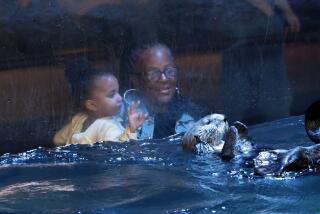Paying a Price for Gift of Life
- Share via
Most of us probably remember the awkward times in our childhood when we began exploring confusing and sometimes embarrassing topics.
For my friends and me in rural Kennett Square, Pa., reproduction was a mystery.
I remember when my friend, Tommy Dewey, and I first discussed our origins while riding the bus home from grade school one day. The question was simple enough: Where did you come from?
Other kids joined in. I recall giving the credit to my parents. But Tommy threw us all for a loop. A “Star Trek” fanatic, Tommy told us that “Scotty” had made him.
It is with that same innocence that those with the National Coalition Against Surrogacy would like us to consider cases like Anna L. Johnson and the estimated 4,000 children who have born into surrogate relationships, according to statistics compiled by the Center for Surrogate Parenting in Beverly Hills.
What happens when children born to surrogate mothers grow up?
Those involved with the coalition are promising reporters that we will soon be writing and telling tragic stories of human greed.
“What is a kid going to think when he or she finds that the birth mother remodeled her kitchen with money from a (surrogate) contract?” asks Sharon Huddle-DeAngelo.
Strip away the rhetoric from both sides of this issue and you still find the lives of children born into surrogate relationships.
It also still leaves the delicate task of explaining these contracts--and the money--to children who are growing older and no doubt riding the school buses.
Ralph Fagen, co-director of the Center for Surrogate Parenting, said the first child produced by a surrogate relationship was born in 1975, making him or her about 14 years old now.
He says the center encourages parents of surrogate children to explain to their kids that they were “born out of special relationships,” that they were specially wanted by their parents, who happened to be infertile.
He said the center encourages parents to be open with their children, urging them to provide any information to them, even details about their surrogate mothers.
A 1989 study of children and families involved in surrogacy suggests that levels of stress are within normal limits.
The study included 11 children born to surrogate mothers and 41 children who are members of the surrogates’ families.
Still, people such as Huddle-DeAngelo and Mary Beth Whitehead-Gould, surrogate mother in the famous Baby M case who is now involved with the coalition, say surrogate arrangements--especially those in which women are paid for carrying other people’s babies--must end.
They say such contracts and transactions are equivalent to “breeding.”
“We don’t want to face that, so we call it surrogacy,” Huddle-DeAngelo said. “I don’t think children will like it at all when they find out they were exchanged for money.”
“We have to look at human bonding,” Whitehead-Gould said recently of the Johnson case. “What about the child, years later, who learns he or she was sold for $10,000?”
Somehow, it seems that any kid might have an easier time understanding Tommy’s cosmic explanation than one involving a surrogate mother and $10,000.
More to Read
Sign up for Essential California
The most important California stories and recommendations in your inbox every morning.
You may occasionally receive promotional content from the Los Angeles Times.










